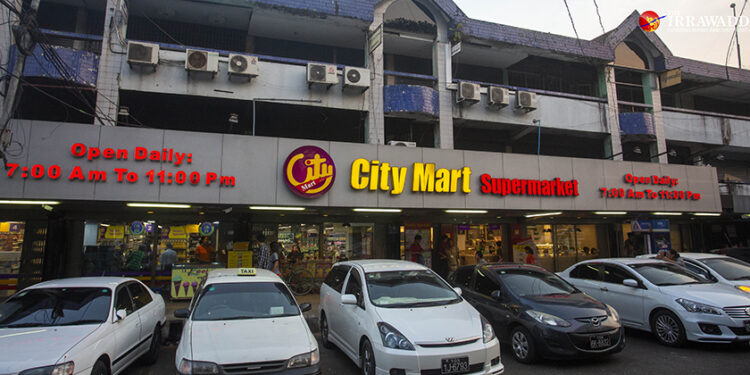The private sector is leading the way in terms of corporate transparency and disclosure, according to the latest Transparency in Myanmar Enterprises (TiME) report by the Myanmar Center for Responsible Business (MCRB).
In the 2019 report, known in Burmese as “Pwint Thit Sa”, seven of the country’s leading companies, including its largest retailer City Mart Holdings Co. Ltd (CMHL), First Myanmar Investment (FMI), Max Myanmar Group and Shwe Taung Group, maintained their status from last year’s report among the top 10, and all continue to improve their disclosure.
In its fifth report to date, MCRB said the owners of some Myanmar companies clearly understand the business case for corporate governance and transparency and that maintaining an up-to-date website contributes to Myanmar’s reform process.
The report assessed the websites of 248 large companies, including listed, public, privately owned and state-owned economic enterprises. The number of companies making information available increased from the 2018 and 2016 transparency surveys in which 182 companies and 100 companies were assessed respectively.
MCRB scored companies based on their online disclosure of information on their corporate profiles, corporate governance, sustainability management and reporting. In its assessment, it used criteria from the ASEAN Corporate Governance Scorecard (ACGS) as well as those linked to the globally respected Integrated Reporting Framework.
The report notes that while the overall disclosure of information by the companies, particularly those in the top 20, is up, the average score of all companies assessed dropped from 7 percent in 2018 to 5 percent this year.
Regarding the private conglomerates’ continued dominance of the transparency survey list, MCRB director Vicky Bowman said, “This shows that what motivates their owners and top executives is not regulatory requirements but the business case for transparency, corporate governance and sustainability.”
She added, “They see it as a means to attract investors and business partners, and build their social license to operate. But they also see a focus on performance—for example on energy efficiency—as a means of making savings for their bottom line.”
Nicolas Delange, managing partner at Yever, a consultancy firm, said, “Most companies and business leaders are embracing transparency because being transparent is the key for them to get access to funding and convince their stakeholders and shareholders that they are doing good and well.”
According to Bowman, the criteria are “a way to measure whether the company ‘walks the walk’ or just ‘talks the talk’. It is more challenging, as it requires companies to put in place systems to capture and measure performance data.”
“Above all I would like companies and government departments and enterprises to see that maintaining an up-to-date website is a win-win situation, which avoids misunderstanding between them and their stakeholders, whether these are voters, shareholders, journalists or potential investors, and is an important contribution to Myanmar’s reform process and SDG16, which concerns effective, accountable and inclusive institutions,” she told The Irrawaddy in an email interview. SDG16 is one of the 17 Sustainable Development Goals established by the UN in 2015. It refers to the goal of securing peace, justice and strong institutions.
According to the report, the situation concerning corporate governance, transparency and business integrity in Myanmar “has generally been improving” since political reforms were introduced in 2011 under the administration of former President U Thein Sein. It said the incumbent National League for Democracy (NLD) government continued the regulatory reforms including a new Investment Law in 2016, and a new Companies Law in 2017.
In August 2018, the government adopted the Myanmar Sustainable Development Plan, which outlined steps to improve corporate governance and disclosure rules, and to enforce them, as well as ways to fight corruption and improve sustainability.
This is the second report on the subject of transparency released this month. In early April, the International Finance Corporation in partnership with the Securities and Exchange Commission of Myanmar, the Directorate of Investment and Company Administration (DICA) and the Yangon Stock Exchange published the Myanmar Corporate Governance Scorecard (MCGS), in which 24 large companies were assessed using the ASEAN CG Scorecard criteria.
Bowman explained, “That MCGS study found that the average score of the 24 companies they assessed was 31 percent, compared to an ASEAN average of 69 percent or more. This partly reflects the greater number of publicly listed companies in some ASEAN markets, but also reflects the fact that CG [corporate governance] is a new concept for many Myanmar companies. Those that are keen to adopt it are pressing ahead.”
MCRB said that 108, or 44 percent, of the companies assessed (based on 2017 DICA data) do not have corporate websites and most of those that do publish little or no corporate governance and performance data.
The five companies listed on the Yangon Stock Exchange had an average score of 32 percent based on a total of 143 criteria, and continue to outperform the public and private companies assessed, where the average score in each category was 4 percent.
State-owned enterprises (SOEs) were included in the 2019 report for the first time. Among the 28 SOEs, Construction and Housing Development Bank and Yangon Electricity Supply Corporation led the way in terms of disclosure. Overall, however SOEs—including the military-owned Myanmar Economic Corporation—had the lowest average score in terms of overall disclosure of corporate governance information.
The report outlined a set of recommendations to the government for enforcing regulatory requirements to disclose information and getting companies to abide by the law.
“Regulatory requirements to disclose beneficial ownership data, currently mentioned in several different directives from the Central Bank and others, should be made consistent and the information should be available via MyCo, the companies register. The government regulators—mainly the Securities and Exchange Commission of Myanmar (SECM) and DICA—should start to enforce these requirements, including through fining companies who do not comply,” Bowman said.
However, most companies seem unaware of the extensive regulatory disclosure requirements for listed and public companies with more than 100 shareholders.
“Companies should disentangle the finances of their company from their foundations or donation programs, and improve the governance and transparency of these, to reduce the scope for these being used for corruption,” Bowman said.
According to DICA, there were 61,631 companies registered as of March this year, but many of them are small and medium-sized enterprises and not included in MCRB’s assessment.
The report also highlighted issues such as corruption, environmental impact assessments (EIAs) and beneficial ownership. Of the companies assessed, 52 disclosed their subsidiaries, of which 19 companies disclosed beneficial ownership data.
According to Bowman, “It [information about beneficial ownership] facilitates banks in undertaking customer due diligence, which is why it is already mentioned in CBM [Central Bank of Myanmar] Directive 21/2015, and helps in combating money laundering. For the extractives sector, it will also enable Myanmar to be compliant with the EITI standards, which should encourage more responsible and transparent investment in the sector.”
The government formed a beneficial ownership (BO) task force last June to encourage businesses to make more information available to the public as part of implementing the EITI standards. As an EITI candidate country, Myanmar is trying to meet 2016 EITI standards, one of which is having businesses’ BO information made available to the public.
According to Delange at consultancy firm Yever, as “Investing is all about trust,” investors will shun companies that do not disclose information on governance, strategy, shareholding structures and the like.
“Companies which are able to embrace transparency will have—and already have—a competitive advantage over their peers: we talk more about them, we respect them more, and we are more keen to do business with them. As an employee I may want to join a good company, as a customer I will select a company selling good products, as an investor I will choose a company with a good reputation. Therefore, being able to disclose information about ownership is essential for building trust. Moreover, in certain sectors—finance, extractive, etc.— it can be mandatory,” he said.

















